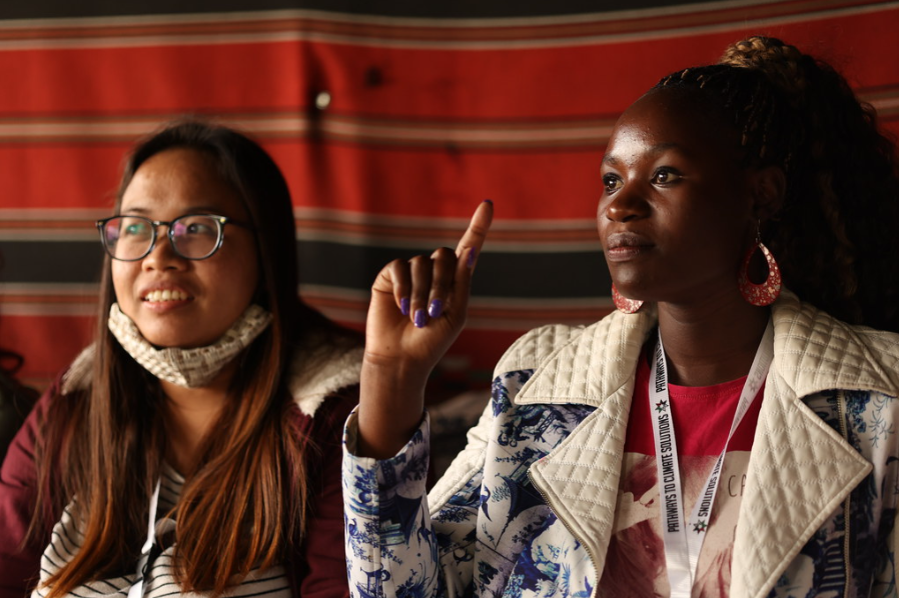Laureen Ongesa of RECONCILE was invited by International Land Coalition Africa to present a paper at the International Youth Day Conference 2022. In this first installment of youth series, she summarizes her thoughts and recommendations based on her paper
I work for Resource Conflict Institute (RECONCILE), an ILC member, as a project officer. I focus mainly on securing tenure for pastoralists and other marginalized group, while addressing climate change, food security and livelihoods through different programs. I was invited to speak at the International Youth Day 2022 by ILC under the thematic area “Secure land rights for youth as a key to attaining climate change and intergenerational equity”. My invitation to speak was preceded by a "call for abstracts" and I am glad that my paper was selected. I believe that promoting tenure security for young people means integrating or involving them in the following three key areas that, in my opinion, stand out in the process of giving women and youth access to land.

Rural youth are seen contributing to enhancing food security through rice irrigation farming in Mwea Town at Ndekia Area of Kirinyagah County, Kenya. Credit: RECONCILE
1. Land use planning
Land use and management play a critical role in mitigating climate change. The role of youth in addressing climate change through land investment is informed by: youth access and ownership to land; youth investment in land; promotion of youth-led innovations; promoting youth access to finance; and supporting youth-led programs. In Kenya, for example, land purchase and lease markets are commonly under-developed, especially where plots of land are too small to be commercially viable. The challenge is when the markets exist, they are costly for young farmers who often lack resources and networks to buy or rent land parcels. The lackluster support to the youth only undermines their ability to explore their full potential in both land use and climate change mitigation. Therefore, sustainable land use will mean investing and appreciating meaningful participation and or engagement by the youth in promoting the land use planning initiatives specially to ensure that both crop and livestock production systems enjoy the sustainability of climate-based resilience for improved rural economy.

Recently, in Nairobi, Laureen Ongesa was part of a team that met with the Ministry of Lands and Physical Planning for land policy discussion on the development of an inventory guideline. Credit: RECONCILE
2. Involving youth in policy discussion
Weak legal and protection frameworks with evolving land governance systems and commodification for those who own land make it quite difficult for youth and women to access productive land. In Kenya, decisions on how to use community land are generally taken by the older generation, for whom young people’s interests are not a primary concern. Therefore, exclusion of young people from participating in land governance and decision-making at different levels is often as a result of land rights frameworks frequently failing to recognize or favor them. Policy makers therefore, should recognize that young people are diverse individuals with unique local knowledge and skills that can add positive value to decision making process and thereby consider inclusion of young people in land debate as a way of promoting youth leadership and representation in matters policy. Therefore, I believe, bridging this gap requires the Kenyan Government through the state department for youth affairs for example, to actively develop a strategy to ensure that opinion and ideas of the marginalized rural youth are considered as meaningful as adult opinion in policy discussions.

One of the youth sponsored by ILC to the first Global Land Forum Youth in Jordan in 2022, Laureen Ongesa (r) took part at the Global Land Forum Youth in Jordan in 2022.
3. Empowering youth in green jobs
Promoting youth access to land can catalyze young farmers’ access to corresponding skills and knowledge, financial services, markets and green jobs. While most of the world’s food is produced by adult smallholder farmers in developing countries, they are less likely to adopt the new technologies needed to sustainably increase agricultural productivity, and ultimately feed the growing world population while protecting the environment. This therefore calls for the need to re-engage youth in green jobs as such Agro-based practices such as agroforestry, livestock keeping, building tree nursery, crop farming, among other practices, are important factors to climate change mitigation, adaptation and resilience. The use of technology in climate mitigation, including climate change modeling and prediction can easily be done by the youth innovation generation, if their governments provide them with the space and tools.
I believe that supporting young people to access and own land provides them with an opportunity to participate in rural economies whereas making progress on food security, gender equality, and adaptation and mitigation to climate change. Therefore, ensuring that youth have secure land rights is like a channel on which to stake their future and invest in green spaces and farm-related productive activities. Government and development partners need to leverage on technology, skills development, as well as regional collaborations and cooperation of non-state actors to transform the entire economies. Youth are more likely than adults to lack finance, as land access, ownership and control is often an option to accessing finance. Thus, securing youth land rights can unlock their financial potential by bridging access to more than just land. Contrary to the perception that youth are not interested in farming and prefer office work for employment, a 2017 survey of 10,000 young Africans ages 18-35 living in rural areas confirmed that almost quarter of them are passionate about agriculture (Rural21, 2017). This therefore indicates there are still chances to expand youth interest in farming provided there are right incentives, thus, securing tenure for youth will be an important part of any sustainable growth and most importantly open the door to more gender and intergenerational equity. I believe that youth has much unrecognized potential on land as a resource and exploiting and recognizing this potential will not only break the poverty cycle for youth but also transform rural economies.




